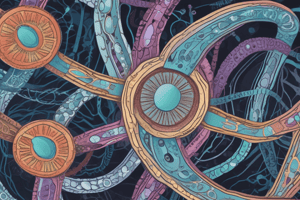Podcast
Questions and Answers
Define the term 'linkage institution'.
Define the term 'linkage institution'.
A linkage institution is a structure within a society that connects the people to the government or centralized authority, including elections, political parties, interest groups, and the media.
Define the term 'political party'.
Define the term 'political party'.
A political party is an organized group of people with roughly similar political aims and opinions that seeks to influence public policy by getting its candidates elected to public office.
Describe the functions of political parties in American politics.
Describe the functions of political parties in American politics.
Political parties give people a connection to their government, nominate candidates for political office, run campaigns, and create structured groups of specific beliefs.
Define and explain the aspects of a political party through; party in the electorate, party as an organization, and party in government.
Define and explain the aspects of a political party through; party in the electorate, party as an organization, and party in government.
What are the differences between the American party system and the European parliamentary democracies?
What are the differences between the American party system and the European parliamentary democracies?
Define and give an example for 'critical elections'.
Define and give an example for 'critical elections'.
Define and give an example for 'maintaining elections'.
Define and give an example for 'maintaining elections'.
Define and give an example for 'deviation elections'.
Define and give an example for 'deviation elections'.
Define and give an example for 'reinstatement elections'.
Define and give an example for 'reinstatement elections'.
Explain the signs and reasons for the decline of political parties in America.
Explain the signs and reasons for the decline of political parties in America.
Define the term 'third party' and explain their contributions to American politics.
Define the term 'third party' and explain their contributions to American politics.
Describe types of third parties and give an example of each.
Describe types of third parties and give an example of each.
Explain in detail the difficulties that third parties face in American politics.
Explain in detail the difficulties that third parties face in American politics.
Flashcards are hidden until you start studying
Study Notes
Linkage Institutions
- Linkage institutions connect individuals to government authority, including elections, political parties, interest groups, and the media.
Political Parties
- Political parties aim to influence public policy by electing candidates with shared political goals and opinions.
Functions of Political Parties
- Provide a connection between citizens and government.
- Nominate candidates for political office.
- Run election campaigns.
- Create structured belief systems within the party.
Aspects of Political Parties
- Party in the Electorate: Citizens identify with political parties, often registering and voting aligned with party preferences.
- Party as an Organization: Comprises formal structures, including workers and activists driving the party’s agenda.
- Party in Government: Elected officials represent party goals and serve as spokespersons.
Differences in Party Systems
- U.S. political party membership is self-identified, whereas European systems generally require dues and attendance at meetings.
Critical Elections
- Mark significant shifts in party control; for example, FDR's Democratic win in 1932 initiated a new political era.
Maintaining Elections
- Occur when the current ruling party successfully retains power; for instance, the Democrats' victories between 1936 and 1948.
Deviation Elections
- Parties appear dominant but face unexpected outcomes; Woodrow Wilson's wins in 1912 and 1916 illustrate such shifts.
Reinstatement Elections
- Following deviation elections, the winning party reclaims its previous dominance; Republicans won after Wilson in 1920, 1924, and 1928.
Decline of Political Parties
- Influenced by skepticism stemming from events like Vietnam and Watergate, leading to reduced reliance on parties due to interest groups' rise.
Third Parties
- Defined as any party outside the two major parties (Democratic and Republican); they can impact election outcomes by splitting votes and highlighting unaddressed issues.
Types of Third Parties
- Ideological: Represent niche beliefs; examples include the Libertarian and Communist parties.
- Protest/Reform: Focus on specific reforms; examples are the Green Party and Reform Party.
- Factional: Result from splits in major parties; notable examples include the Dixiecrats and the Progressive Party.
Challenges for Third Parties
- Third parties struggle to gain traction in the U.S. due to a winner-takes-all electoral system, making it challenging to effectively compete against major parties.
Studying That Suits You
Use AI to generate personalized quizzes and flashcards to suit your learning preferences.




